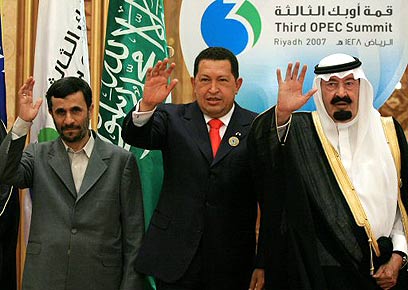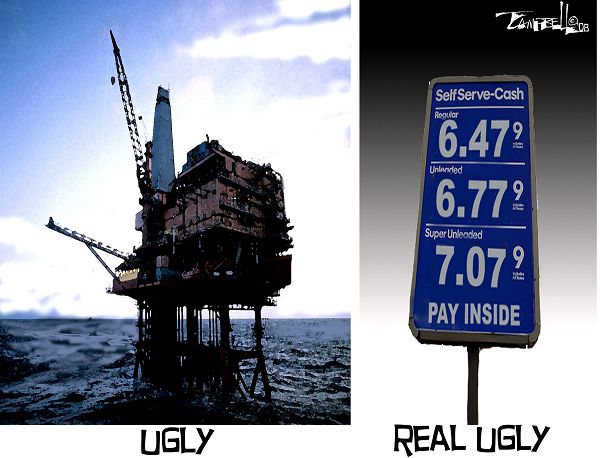
 | The Xenophile Historian |
THE HOLY BOOK OF UNIVERSAL TRUTHS,
K. U. P.
(Kimball's Unauthorized Perversion)
In pre-capitalist societies, wealth was measured in the amount of land, livestock or workers somebody owned. Then with the arrival of capitalism, one's wealth was measured in the amount of precious metals and gems owned, or their equivalent value in paper certificates/banknotes. We still follow that system, even without the gold standard, but since the invention of the internal combustion engine, a more accurate measure of wealth might be how much energy one has access to. I say that because nothing can reduce modern man's standard of living as quickly as the loss of available energy. If you don't believe me, remember the last time you were in a power blackout that lasted more than an hour, and how you looked forward to its end. Indeed, some futurologists have suggested that tomorrow's economy will be based on an energy standard. And while we can (and should) make more efficient use of the energy we're already consuming, I still expect total energy consumption to keep going up; try as I might, I'm still using more electricity than I did at this time last year, presumably because of all the electronic gadgets we now depend on.
The economy of the world's most advanced countries has been powered by petroleum since (roughly) 1900. For more than half of the twentieth century, the cost of that petroleum was relatively cheap, and only in wartime did we worry about a shortage. Therefore, the price of oil was not a factor in economic ups and downs. The companies that brought energy to us became filthy rich (John D. Rockefeller was sometimes accused of being the real owner of the United States), but we had no fears that they would try to destroy Western civilization; after all, if they did destroy it, they would starve, too! Then the world's main oil production center shifted from Texas to the Middle East, the Organization of Petroleum Exporting Countries (OPEC) was formed, and the price of crude oil began to rise.
As long as foreign (mostly American and British) companies controlled the oil wells of the Third World, they paid as little as possible to the host countries for the privilege of extracting the oil. Therefore you could say that the price increases of the early 1970s were only fair; it was time for the people living on and near the oilfields to get a piece of the economic pie. If all the OPEC countries did was make a profit, we wouldn't have much reason to complain. The problem was that they also quickly learned they could use that oil as a weapon, to force the developed countries to submit to their interests. We first saw this in the aftermath of the 1973 Arab-Israeli War, when OPEC stopped selling oil to the United States and the Netherlands for six months, causing the first of two serious energy crises in that decade. The second crisis came with the Iranian Revolution of 1979; Iran at that time only supplied the United States with 3 percent of the oil it needed, but losing access to those wells and refineries caused a 100 percent shortage! On top of all that, the Arabs, especially the Saudis, used their new-found wealth to buy the West bit by bit, from various choice pieces of real estate, to a chunk of FOX News stock, to the unsuccessful 2006 Dubai ports deal.
Today it seems that oilfields are a bad influence on the countries that have them. OPEC is a front organization for terrorism; most of the countries that give money to terrorists are OPEC members, and they get that money from their oil industries. Look at who belongs to OPEC: Algeria, Indonesia, Iran, Iraq, Kuwait, Libya, Nigeria, Qatar, Saudi Arabia, United Arab Emirates, and Venezuela. Alas, most of them are corrupt and undemocratic, and all of them are Moslem except Venezuela. For a while I preferred filling up the family cars at gas stations that carried Citgo gas, because Citgo gets it from Venezuela instead of the Persian Gulf. Then Hugo Chavez became a real S.O.B., so now the only OPEC country I can buy from (and not feel guilty about it) is post-Baathist Iraq.
(By the way, for those who think the war in Iraq is only about oil, I would ask: if oil is the issue, why didn't we go into Venezuela, which is a lot closer and also has an annoying head of state? And why didn't the price of gas go down after the Iraqi pipelines started carrying the "black gold" again? Never mind missing weapons of mass destruction, it looks like we didn't find any oil in Iraq! If President Bush, Vice President Cheney, and their friends at Halliburton really had that much control over the price of gas, don't you think they'd keep it below $1.25 a gallon, and thereby perpetuate the Republican Party's hold on the US government? In February 1999, I could get gas for as little as 86¢ a gallon, and then-president Clinton was riding high in the polls, even though Congress had impeached him. Coincidence?)
What all this means is that if we're serious about winning the War on Terror, we'd better find another source for our energy needs, a non-OPEC one. Look at past examples: would we have been able to win World War II, if a vital resource like coal, steel or oil came to us from the Axis? Indeed, many Europeans had second thoughts about opposing communism, when the Soviet Union built a natural gas pipeline to West Germany. This may be the first war that a country tried to win, while financing both sides!

Neil deGrasse Tyson, an astronomer and director of the Hayden Planetarium, looked at what would encourage our country to explore space. Learning abstract knowledge is not enough; we launched astronauts and space probes for that reason in the 1960s, but once we reached the moon, the public got bored with the space program, and called it a waste of money. Tyson concluded that only three motivations are strong enough to keep people working on a major project until they finish it: the need for defense, a promise that the project will make money, and what he called "praise of power," which means the project will pump up the ego of the builder. Here are eleven great projects or "wonders" of the past, with the motivations behind them:
|
Funding Challenges Motivations for Major Projects -- Three Drivers |
|
| Project | Why It Was Built |
| Great Wall of China | Defense |
| Manhattan Project | Defense |
| Interstate Highway System | Defense |
| Apollo Program (the space race) | Defense |
| Voyages of Columbus | Promise of Economic Return |
| Magellan's Expedition | Promise of Economic Return |
| Tennessee Valley Authority | Promise of Economic Return |
| Pyramids | Praise of Power |
| Vatican | Praise of Power |
| Versailles | Praise of Power |
| Taj Mahal | Praise of Power |
Source: http://www.chicagospace.org/tyson_space.html
The "praise of power" motivator may have worked for pharaohs and popes, but nowadays only totalitarian dictators can get away with it. Therefore an energy independence project will have to be driven by defense concerns, or the promise of riches for those that do it--preferably both.Remember what I said about conflicting energy policies? Conservatives want to increase the available energy supply, while liberals prefer solutions that promote conservation and reduce pollution. To wean ourselves from OPEC, I think we're going to have to try as many of them as possible, and stop bickering over which solution is the best. Therefore I propose that the energy "Manhattan Project" should include all of the following:


Support this site!